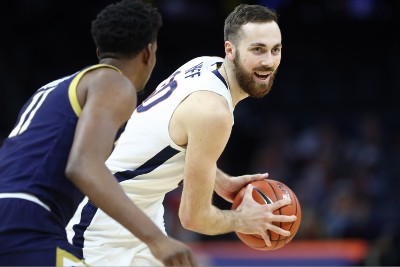
My deep dive inside the numbers tells me that the ACC Player of the Year should be … Jay Huff. It won’t be, but that’s who it should be.
And the fact that it should be Jay Huff means it probably also won’t be Sam Hauser, who might otherwise be your favorite based on counting numbers.
Hauser (15.8 ppg, 6.8 rebounds/g, 51.7% FG, 44.4% 3FG) has good counting numbers that get better when you factor tempo.
BartTorvik.com puts the average tempo at 68.7 possessions per team per game. Virginia averages 60.0 per game. Put Hauser on just an average-tempo team, and he averages 18.1 points and 7.8 rebounds per game.
Basically, he’s Justin Champagnie (18.4 ppg), just more efficient (Champagnie shoots 49.4 percent from the floor and 33.3 percent from three).
A key difference being that Champagnie, the Pitt forward, averages 11.1 rebounds and ranks 12th in the ACC in defensive rating (97.4).
Which, OK, fine. Gets us back to Huff, who leads the ACC in defensive rating (91.1), ranks fifth in offensive rating (125.6), and is a solid #1 in box plus/minus (12.3, with Hauser a distant second, at 10.6, and Champagnie fourth at 9.7).
As with Hauser, Huff’s counting numbers aren’t spectacular – 13.1 points and 6.9 rebounds per game.
Extrapolate those out at average tempo, and they look a little better – 15.0 points per game, 7.9 rebounds per game.
Still, that’s not Champagnie, or even Duke forward Matthew Hurt (18.7 ppg, 6.1 rebounds/g, 56.0% FG, 43.7% 3FG, 131.0 ORtg, 106.3 DRtg, 26.2 PER).
Huff’s efficiency numbers are through the roof: he’s shooting 59.2 percent from the floor, 40.6 percent from three, 83.7 percent from the line, for an effective field-goal percentage of 66.2, best in the league.
And the biggest efficiency number – PER, player efficiency rating – has Huff #1 in the ACC, at 31.1, with Champagnie second, at 28.1.
I’m not a fan of the idea of player of the year and MVP awards just automatically going to the best player on the best team, just because it seems lazy to go that route.
That said, if you did think that way, is it clear who the best player on the best team this year?
I mean, it is to me, but I’m betting here that Hauser gets more votes, probably a good many more, for player of the year.
I also think that because of that, they’re going to cancel each other out, and you’re going to end up with, most likely, one of two guys whose teams are playing on Tuesday in Greensboro, which is the punishment for teams that finish between 10 and 15 in the league standings.
The easy out here is Champagnie.
Then looking at the All-ACC first team, you get Champagnie, Hurt, Hauser as locks, and I’m betting the other two spots will end up going to Georgia Tech guard Jose Alvarado (15.5 ppg, 4.2 assists/g, 51.2% FG, 40.6% 3FG, 121.0 ORtg, 99.5 DRtg, 22.3 PER) and one between Georgia Tech center Moses Wright (18.0 ppg, 8.1 rebounds/g, 54.2% FG, 39.3% 3FG, 119.5 ORtg, 98.6 DRtg, 27.5 PER) and Virginia Tech center Keve Aluma (15.9 ppg, 8.0 rebounds/g, 50.0% FG, 37.0% 3FG, 118.2 ORtg, 94.9 DRtg).
I’m not saying this is how I’d vote (this is one where I don’t get a vote). I’m saying this is how it’s going to turn out.
That the guy who should be the player of the year isn’t even going to be first-team.
Because the process is stupid, basically.
Story by Chris Graham










